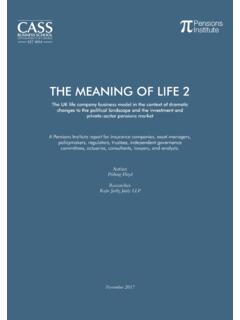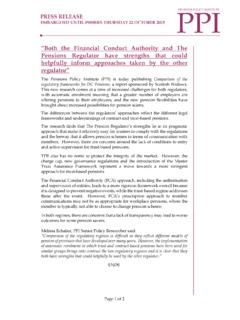Transcription of MSc in Pension Science - Pensions Institute
1 Cass means businessMake the right moveSpecialist Masters CoursesMSc in Pension SciencePension ScienceThe aims of the degree are to provide studentswith a comprehensive understanding ofpension systems and their applicability invarying international completion of the programmegraduates will: understand the different types of pensionsystems and how they have developed understand how these different pensionsystems are financed and the short and longterm risks they face understand how these risks can bemeasured and managed have obtained certain key skills in IT andquantitative methods be able to provide high level advice togovernments, institutions and companies in any country on Pension students will be highly motivated, and will be graduates in economics, finance,insurance, accounting, law or other relevantbackground, who want to become the course focuses on the connectionbetween theory and practice, students willgain an understanding of how to apply theirknowledge in practical situations.
2 Graduates will typically gain employment inpensions-related consulting and policy fields ingovernment departments, Pension supervisoryauthorities, Pension consultancies, pensionschemes, Pension funds, life companies, andthe feesFor up-to-date information on fees andscholarship please visit our website EconomicsEconomics deals with the allocation of scare resources between competing uses both contemporaneously andintertemporally, and with the incentives that influences this allocation. Pension economics considers the way inwhich individuals, companies and the state provide for Pensions ; and with the consequences of accumulatingpension assets for the wider macroeconomy. While not attempting to train students as professional economists, this module does aim to provide a secure grounding in the theory and practice of economics insofar as it deals with Pension Outcomes Understand the key types of Pension schemes Understand the role of Pensions in maximising individual lifetime welfare Understand the role of Pensions in individual savings and retirement decisions Understand the role and consequences of Pension plans from the company s viewpoint Understand the role of Pensions in promoting aggregate savings Understanding the social welfare implications of pensionsQuantitative Methods for PensionsThe aim of this course is to provide students with a toolkit of quantitative techniques required by a Pension scientistto solve problems in Pension economics and Pension Outcomes Understand the basics of the following mathematical techniques.
3 Financial maths (Compounding,Discounting, Rates of return), Matrix algebra (especially inverses and simultaneous linear equations),Differentiation, Integration, Taylor's approximations and linearization, Static constrained optimisation, Dynamic programming, Differential equations and phase diagrams Understand the basics of the following statistical techniques: Descriptive statistics, Distributions (Binomial,Normal, t, Chi-square, F), Multiple regressionPension AccountingAccounting is the language of the financial world, and plays a significant role in the analysis and management of Pension fund assets and liabilities, at both organisational and national levels. While not attempting to train futurepension fund managers as accountants, this module does aim to provide a secure grounding in the practice andunderstanding of accounting, the characteristics and limitations of accounting data, and the role of accounting in the broader financial environment, including the its role in financial analysis and Outcomes Have the technical knowledge to read, understand and analyse financial statements Understand the impact of institutional pronouncements upon accounting numbers Understand the role of accounting as an input to corporate valuation Understand the role of accounting in the valuation of Pension fund assets and liabilities Understand the Pension aspects of national income accountsCourse InformationComparative Pension Systems and RegulationThis course has a twofold aim.
4 It will acquaint students with the variety of different Pension systems and the public-private mix within these across Europe, North America, Australasia, South America and Japan, and will alsomake passing reference to the developing nations of south east Asia and Africa. It will also explain the role ofinternational institutions in Pension policy, with particular reference to the growing role of the European Union andCommission, but also looking at the World Bank and the International Labour Office as advisors and standard setters. Learning Outcomes The nature of Pensions systems, and the principles underlying these, in a wide variety of countries The role of the European Commission in regulating Pensions and the nature of its powers The role international organisations, particularly the World Bank and the International Labour Office The lessons that different countries can learn from one another in making Pensions policyPension FinanceFinance is a branch of economics dealing with the financial implications of economic decision making.
5 Pensionfinance considers the financial aspects of Pension provision. While not attempting to train students as financeprofessionals, this module does aim to provide a firm grounding in the theory and practice of finance insofar as it deals with Pension Outcomes Understand the allocation of wealth to different asset classes Understand the financial aspects of defined contribution Pension plans Understand the financial aspects of defined benefit Pension plans Understand the valuation of Pension liabilities and role of strategic asset allocation in delivering pensionobligations Understand the risk management of Pension funds Understand Pension fund investment performance and attributionActuarial Principles for PensionsThis module aims to enable students to gain insight into the work which actuaries carry out in relation to the designand operation of Pension Outcomes The benefits typically provided by defined benefit and defined contribution Pension schemes The issues surrounding unfunded social security Pension schemes The work carried out by the actuary in
6 Performing a valuation of a Pension scheme The way in which the investment strategy for a defined benefit scheme might be devised The regulatory issues surrounding Pension schemesPension LawPensions are a major financial asset for many millions of people; curiously it is only in recent years that the law has begun to recognise the importance of the need for managing the balance of interests of employees, the self-employed, employers and providers and the interests of the government in relation to public and privatepensions. In the UK (and the US) in particular the resultant substantial increase in law and regulation has become an issue in course explores the general principles of law and regulation as it applies to Pension rights and expectations andin particular considers the dilemmas of lawmakers as they attempt to draw the balance between protection of rightsand expectations and the need to allow free market principles to Outcomes The distinction between state, personal and workplace Pension rights.
7 Trustee systems The balance between regulation and compliance and scheme expansion: the regulatory framework: dispute management, reporting, the regulator, Pensions protection Pensions and investments: investment controls, corporate governance, ethical and social considerations Pensions and funding guarantees: funding, underfunding, surpluses and deficits, unfunded arrangements Pensions in corporate transactions: mergers and acquisitions, reconstructions, corporate failuresSocial Policy and Ageing PopulationsThis course provides a context for the contemporary interest, both by academics and policy makers in Pensions . It will be look at issues other than Pensions that ageing societies bring with them, in particular those related to long-term care of the frail elderly and workforce ageing. It will emphasise the multi-faceted nature of the ageingchallenge and responses to it. Learning Outcomes The extent of demographic ageing, its causes and its expected direction and differences across time andacross different geographical areas The relative capabilities and requirements of different age groups and the extent to which they contribute to society and the economy Interrelationships between different aspects of societal ageing and the responses that are proposed withrespect to these separate aspects The consequences of proposed reforms in terms of their implications for the well being of older people and of other groups in societyFor an application form or further information please contact us( )Please complete thefollowing and return this to:Hannah AndersCass Business School106 Bunhill RowLondon EC1Y 8 TZTel direct: 020 7040 8468Or email: name: _____ Last name: _____Address:_____Telephone: _____ Email.
8 _____I would like more information on Pension Science " The Department for Work and Pensions is enthusiastic about the development of this qualification, and would welcome applications from individuals holding the prospective Pension Science MSc. The combination of economics, finance and actuarial Science on the one hand, with an understandingof law and regulation on the other, would be very well suited to the analytical and policy needs of the Department. Robert Laslett, Chief Pensions Economist from the Department of Work and Pensions "In term 3 you will have to choose 4electives amongst the following list:*Corporate GovernanceConsulting SkillsFinancial DerivativesFinancial Risk ManagementLife Insurance And Pensions ManagementBehavioural Psychology (Judgment & DecisionMaking)Behavioural FinanceMarketing of Financial ServicesRegulation of Financial ServicesComparative Pension LawInsurance Law & RegulationPrivate Equity InvestmentQuantitative Asset Management Longevity Risk in Pension ProductsFinancial Extreme Value StatisticsPensions Tax IssuesPersonal FinancePension Science TimetableTe r m 1 :Induction: Quantitative Methods & IT SkillsPension EconomicsQuantitative Methods for PensionsPension AccountingComparative Pension Systems & RegulationTe r m 2 : Pension FinanceActuarial Principles for PensionsPension Law Social Policy and Ageing PopulationsTe r m 3 :Compulsory.
9 Research Project ManagementSecond half of Term 3 and summer to end September: Pensions dissertation*Not all electives will be offered every yearPension ScienceThe World s first Masters with a Pension focus. Pension design andregulation are generally accepted to be complex issues for all is clearly needed is a well-trained group of professionals capableof providing appropriate and sustainable Pension Business School, City University, LondonMSc in Pension ScienceThe reputed Cass Business School is introducing a new MSc in Pension Science , the first of its unique degree will offer a 12 month multidisciplinary programme covering core courses inpension economics, Pension finance, comparative Pension systems, social policy and ageing,accounting, law and regulation, and relevant quantitative Pension Science programme will: provide you with a high quality of eduction give you an understanding of the key issues confronted by Pension scientists in varyinginternational contexts provide you with a thorough understanding of.
10 # Pension economics# Pension finance#actuarial principles#comparative Pensions systems#the social policy context of Pensions # Pensions accounting# Pension law and regulation#relevant quantitative informationFurther information about the University, its courses andfacilities can be found in the postgraduate prospectus, whichis available by calling: +44 (0)20 7040 8014or e-mail: also online to find the business schoolBy Underground The nearest underground stations areMoorgate and Old Street on the Northern Line (City branch);Barbican and Moorgate on the Metropolitan and Circle Lines;and Liverpool Street on the Central Business School is between five and ten minutes walkfrom the nearest underground Cass Business School is located on BunhillRow, which is situated off Chiswell Bus routes 4, 8, 21, 25, 43, 55, 56, 76, 100, 133,141, 153, 172, 214, 243, 271, 501 and Car parking for BunhillRow is either in the BarbicanCentre s car parks or in theNational Car Parks inAldersgate Street, LondonWall and Finsbury Bunhill RowLondon EC1Y 8 TZT +44 (0) 20 7040 8606F +44 (0) 20 7040 business schoolCass Business School provides exceptionally high-quality education and is one of the top five of Business Schools in the UKand one of the top ten schools in the courses have a strong practical focus and have been developed in direct response to the needs of employers.







